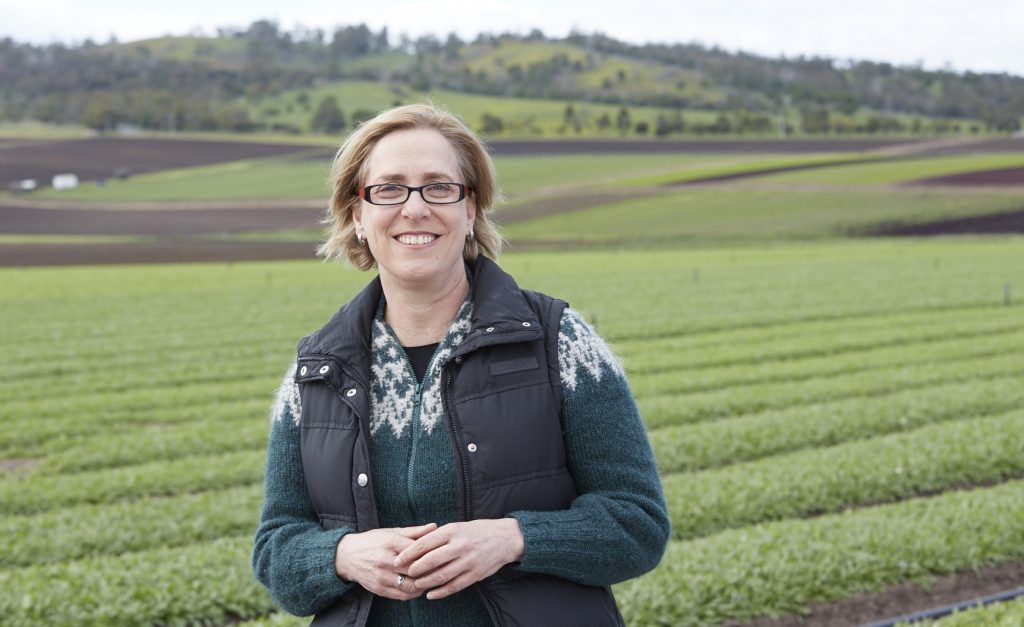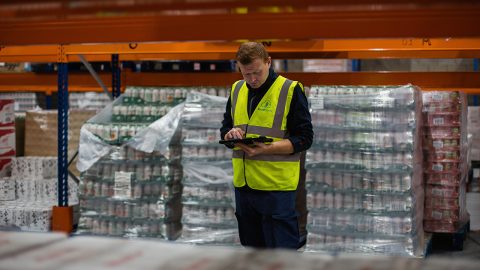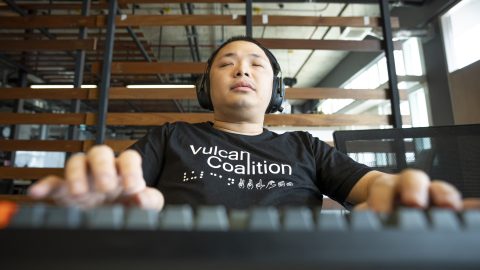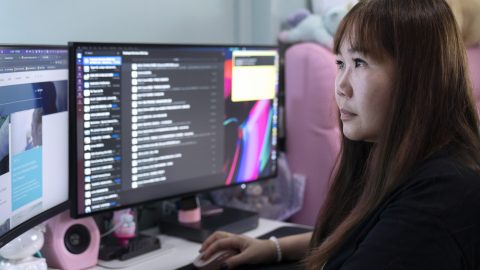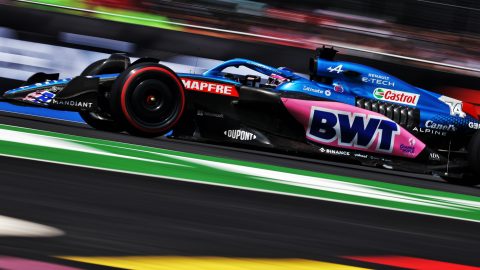A ‘force of nature,’ Ros Harvey uses tech for an internet of oysters, sustainable farming and better working conditions
Ros Harvey, who used technology to improve the lives of 1.75 million garment workers in nine developing countries and is now upending oyster farming and agriculture in Australia, calls herself an unlikely entrepreneur.
“I’m 52, I’m a woman, and I’m not a technologist,” she says.
But those who know her best emphatically disagree.
“Ros is the quintessential startup person, with incredible passion and steely determination, masked by a soft approach,” says Chris Vein, who was the U.S. deputy chief technology officer under President Obama. “She has always been a pioneer and a force of nature. She can see into the future and translate that into action before anyone else.”
Harvey used novel technology in the early 2000s to create a global enterprise called Better Work that brought together retailers, governments, factories, unions and researchers to improve conditions for women in apparel supply chains.
When a family crisis forced her to leave Geneva and return to Tasmania, she turned her attention to the island’s needs and built an “internet of oysters” that uses sensors and the Internet of Things to determine whether harvesting is safe or not. Now she’s expanding her business – called The Yield – to help agricultural farmers “feed the world without wrecking the planet.” The Yield is developing apps to take the guesswork out of farming, with its first one focused on when and how much to water crops. And just like Better Work, Harvey plans to take The Yield global.
It’s all driven by her passion for social justice and a sustainable future – buoyed by her entrepreneurial spirit.
Harvey grew up in Sydney. When she was 20, she traveled to Tasmania, a sparsely populated island state almost the size of Ireland off the southeastern tip of Australia, for a bushwalking adventure. There she met her husband and adopted his home as her own, weaving herself into its fabric.
She began working with homeless young people in Tasmania, and then worked on women’s employment policy while she put herself through university at night. She was active in her union and became its president, which led to a position with a trades and labor council, focusing on workplace change issues. “The world was changing, and we needed to alter the way we dealt with industrial relations and social dialogue in the workplace to handle those changes, because otherwise, everyone would lose,” she says.
Her work with unions and pay-equity cases for women and people with disabilities took her to Cambodia with the International Labour Organization about 15 years ago.
Harvey leveraged global fashion companies’ desire to maintain positive reputations among consumers with the need for better incomes in developing countries such as Cambodia. She developed a platform based in Microsoft’s cloud – “back when the cloud was hardly a word” – that used tablet PCs and trilingual reports to provide data to American buyers, Chinese owners and Cambodian factory operators. Harvey created a social enterprise, with the costs being shared among all three parties. By using the cloud, the cost of audits was slashed to $2 a year per worker, from $50, and Harvey worked with companies to spend some of that savings to improve worker conditions and productivity.
It went so well that she was asked to expand globally, and she moved to Geneva, where the International Labour Organization was headquartered, and spent the next few years setting up a team and adding new countries to the system.
“Now it seems an obvious thing, but at that time it was early, and Ros’ work was a leading example of taking this private interest and promoting a public-sector good,” says Amy Luinstra, who became Harvey’s deputy at Better Work. “Her total enthusiasm and infectious drive in making her program the best it can be impressed me. But she’s also got this unique ability to solve the detail problems, as well as see the big picture and the way it all links up with everyone else’s agendas, and get people on the same page.”
When Harvey’s son became ill, she moved her family back to Tasmania, taking with her “a great passion for technology and the understanding of how it can transform lives.” The island didn’t have a lot of apparel factories, so Harvey turned her attention to the cornerstone of its economy: agriculture, including oyster farming.
The Yield was born in that transition.
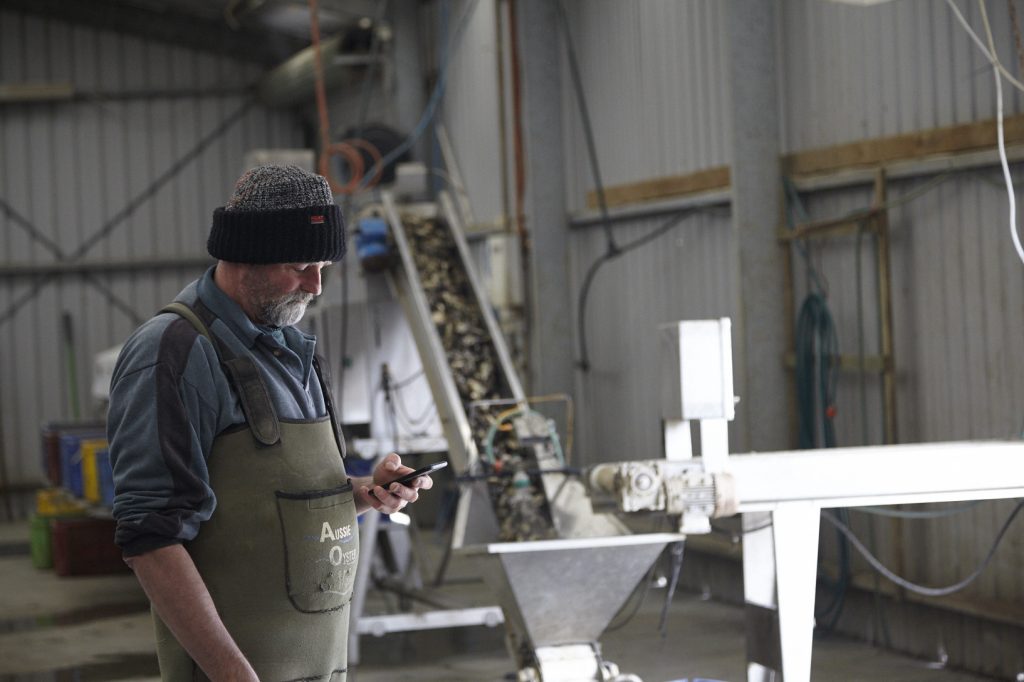
Tasmanian marine farmers produce about 36 million oysters a year. Because oysters are filter animals, state regulators shut down harvesting when there are heavy rains that could wash contaminants into the oyster bays. The traditional way to measure the danger was through using rain gauges from public weather stations that could be hundreds of kilometers away.
Harvey and her team used Microsoft’s Azure IoT Suite to power real-time sensors that sit in the oyster leases and analyze the water the oysters drink. The information is ingested into Microsoft’s Azure cloud platform, where machine learning and advanced analytics capabilities make data-based predictions that are shared with growers and regulators via real-time dashboarding. Using data analytics, The Yield’s technology is set to reduce unnecessary harvesting closures by 30 percent, saving about $5.3 million a year for the Tasmanian growers’ $24 million industry.
The Yield also created a suite of enterprise productivity tools for growers from the same data, which helps with scheduling labor and tracking provenance and food safety.
The new system not only produces more precise harvesting, but the data also is provided to researchers, who are developing new models for animal husbandry and disease management. Two government food authorities and more than 300 oyster growers already rely on The Yield in its first year of operation.
We have two purposes: Feed the world without wrecking the planet, and create public good with private effort.
Harvey isn’t one to keep her sights small. She has now expanded The Yield to tackle one of the biggest global challenges: “How are we going to feed the world? We need to increase food production 70 percent by 2050, when productivity in agriculture has been stagnant for decades and when we have to cope with growing input constraints and the unprecedented challenge of climate change.”
Farmers, retailers, food-safety authorities, banks and insurers all struggle with the uncertainty of weather and its impact on the business of growing food. That’s especially true with irrigated perennial crops, such as cherries, apples, avocados, mangoes, nuts and grapes, which are high-margin and need intensive support. Micro climate conditions drastically affect decisions on when to plant, harvest, irrigate, feed and protect these crops. Yet the world’s weather forecasting system is done on a “very coarse, 25-by-25-kilometer grid,” Harvey says.
So The Yield’s newest Internet-of-Things effort lasers in on weather affecting each farm, each field, each row and even each plant, to help growers optimize decisions that save money and make farming more sustainable. The system doesn’t just measure the weather but also predicts it and converts it into crop-specific knowledge.
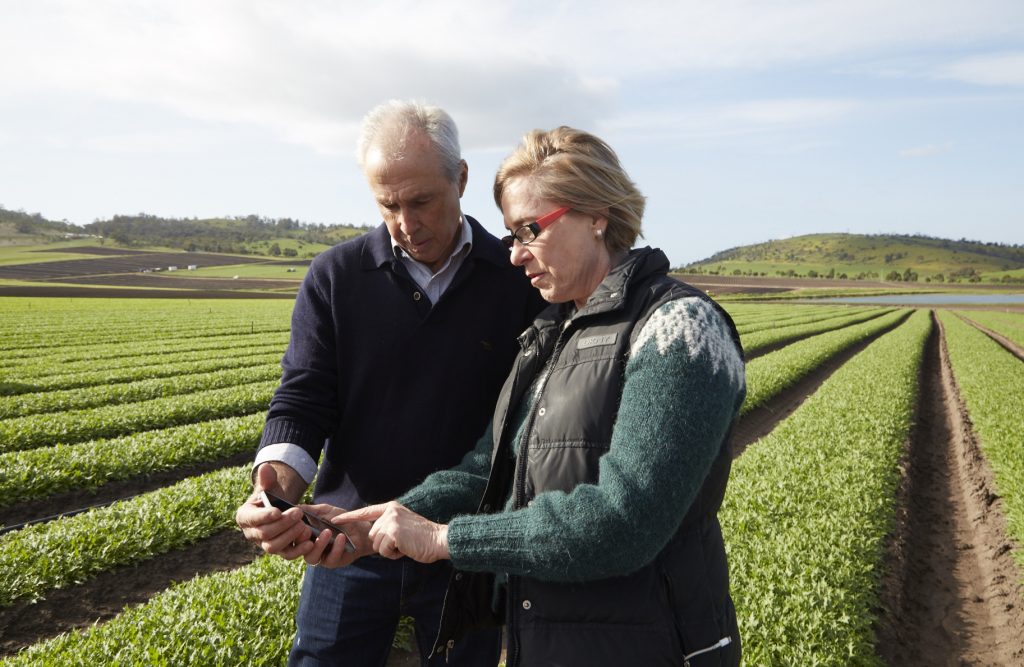
Since Harvey founded The Yield in November 2014, she has raised 5 million Australian dollars ($3.75 million) in capital, with Bosch as a major investor, exceeded revenue goals by 45 percent while keeping costs 2 percent below target, and reached a 95 percent conversion rate on customer registration for the oyster solution. In addition to the company’s three Australian bases, The Yield is planning to open an office on the U.S. West Coast, Harvey says – possibly in Washington state, which has a climate similar to Tasmania’s.
“We have two purposes: Feed the world without wrecking the planet, and create public good with private effort,” Harvey says. “I see the transformative power in tech, and I feel the real gains will be made in new business models. Getting the incentives aligned is where we’ll see real change.”
One of the biggest challenges is communication and coordination with such a large number of diverse parties. The Yield is in the midst of one of the most complex environments possible, dealing with both hardware and software, social and legal issues, and “every type of discipline you can imagine,” says Mike Briers, Harvey’s business partner and founding director of The Yield.
In Tasmania, some oyster growers are large companies, and others do it as a hobby. There are different groups of growers in each bay or catchment area around the Australian island, as well as state regulators. And there are university and government researchers looking at things like weather, tides and water quality. That’s a lot of relationships to navigate and disparate interests to combine. But Harvey didn’t stop negotiating until she had found a solution that motivated everyone to participate.
“Ros chose the hardest model to crack, so it makes the rest of what she’s doing, with farmers and agriculture, easier now,” Briers says. “Oysters are usually an appetizer, and then you have the main course, and that’s a great metaphor for how she worked out all the technical problems before moving on to the broader agricultural sector. It’s a classic example in Ros’ strategy to get something done as soon as possible and learn by doing.”
And she has retained her solid commitment to gender equality. More than 60 percent of The Yield’s 15 employees are women, including on the engineering and data science team. Staff members come from eight different countries and speak nine languages. The Yield won an Australian business diversity award this year for its efforts.
“Ros has assembled a world-class team with the best and brightest,” says Vein, who was about to leave the White House for a position with the World Bank when he met Harvey and agreed to join her advisory board for a project that was the The Yield’s precursor. “It’s that diversity piece that amplifies her passion and commitment to changing the world, and that’s what has made her successful and will continue to do so.”
Harvey may not be a technologist by training, but she says she’s always been fascinated by technology, which she calls “the plumbing of the knowledge economy.” She bought one of the first computers available as well as one of the first mobile phones.
And sometimes, a dissimilar background is the key to getting things right with a new venture.
“Technologists are in love with the technology, but with my background in international development, my starting point is always the business problem that needs to be solved,” she says. “International development is littered with examples of donors throwing money at something, and when the money dries up, it all collapses. So you need to find a sustainable business model and work with the community you’re serving to make sure you’re meeting a real need and a real purpose. And that underpins how I think about technology.
“We called it The Yield for a reason,” Harvey says, “because if you can’t affect that, you don’t have a business.”
Top photo: Entrepreneur Ros Harvey is tackling one of the biggest global challenges: feeding the world. (Photo by Chris Mollison)

